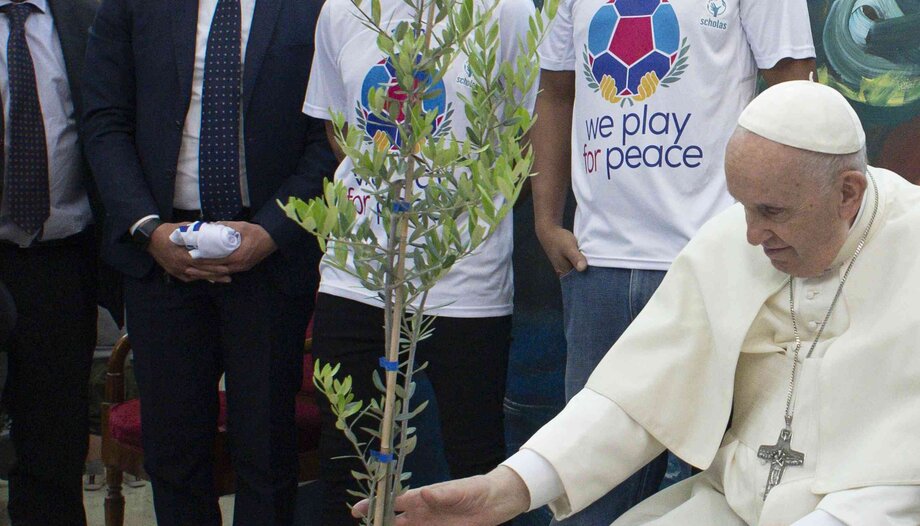On September 1, 2024, the Church celebrates the Day of Prayer for the Care of Creation. This year, the theme chosen by Pope Francis is "Wait and act with creation". As the Pontiff explains in the message published for this occasion, the main motif "refers to the Letter of St. Paul to the Romans 8:19-25, where the apostle clarifies what it means to live according to the Spirit and focuses on the certain hope of salvation through faith, which is new life in Christ".
Taking these verses from the BibleThe Pope says, we can start "from a simple question": "How is it that we have faith? And he himself answers that "it is not so much because 'we believe' in something transcendent that our reason cannot understand", but "it is because the Holy Spirit dwells in us".
Francis further explains this statement by saying that "the Spirit is now truly 'the foretaste of our inheritance,' as a pro-vocation to live always oriented toward eternal goods." It is precisely for this reason that "the Spirit makes believers creative, proactive in charity". And, with this charity, Christians are introduced "on a great path of spiritual freedom" that makes them realize that "they are children of God and can address Him by calling Him 'Abba, that is, Father'".
This, says the Holy Father, should fill us with hope, because "the love of God has conquered, conquers and will always continue to conquer. Despite the prospect of physical death, for the new man who lives in the Spirit, the destiny of glory is already certain".
Faith as a task
Accordingly, the Pope affirms, "the Christian's existence is a life of faith, diligent in charity, and overflowing with hope". However, this is no reason for the disciple of Christ to become complacent. "Faith is a gift," the Pontiff explains, "but it is also a task, to be carried out in freedom, in obedience to Jesus' commandment of love."
This is realized "in the dramas of suffering human flesh," notes the Bishop of Rome. "Christian salvation enters into the depths of the world's pain, which affects not only human beings, but the whole universe."
Therefore, Francis continues, "the whole of creation is involved in this process of a new birth". In this way, the charity of the Christian "must also extend to creation, in a 'situated anthropocentrism', in the responsibility for a human and integral ecology, the path of salvation of our common home and of us who live in it".
Liberation of man, care for creation
The Holy Father emphasizes in his message that "the liberation of man also entails the liberation of all other creatures who, in solidarity with the human condition, have been subjected to the yoke of slavery". In this sense, "in Christ's redemption it is possible to contemplate with hope the bond of solidarity between human beings and all other creatures".
For this reason, continues the Pope, "the Holy Spirit keeps the believing community alert and continually instructs it, calling it to conversion of lifestyles, so that it may oppose human degradation of the environment".
It is important, therefore, that man be docile to the Holy Spirit, since obedience to him "radically changes man's attitude: from 'predator' to 'cultivator' of the garden". In this way, the human being manages to avoid that "form of idolatry" which consists in "pretending to possess and dominate nature, manipulating it at will".
"Therefore," says Francis, "the care of creation is not only an ethical question, but also an eminently theological one, since it concerns the intertwining of the mystery of man with the mystery of God." Likewise, "there is a transcendent (theological-ethical) motivation that commits the Christian to promote justice and peace in the world, also through the universal destination of goods: it is a question of the revelation of the children of God that creation awaits, groaning as if in labor pains".
With and for creation
The Pope concludes his message by clearly summarizing the motto of the Day of Prayer for the Care of Creation. "To hope and act with creation means, then, to live an incarnate faith, which knows how to enter into the suffering and hopeful flesh of people, sharing in the expectation of the bodily resurrection to which believers are predestined in Christ the Lord."
Catholics, the Holy Father concludes, must aspire to "a holy life", "a life that becomes a song of love for God, for humanity, with and for creation, and which finds its fullness in holiness".







